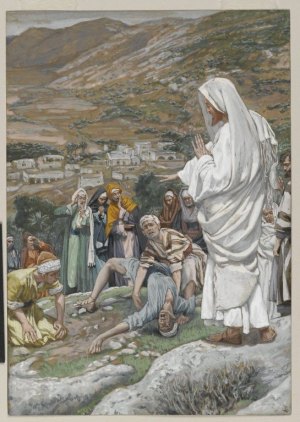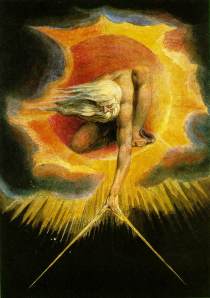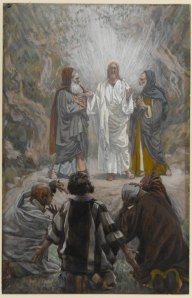August 9 2009 Nineteenth Sunday in Ordinary Time
About the sources used. The readings on this site are not official for the Mass of Roman Rite of the Catholic Church in the USA, but are from sources free from copyright. They are here to present the comparable readings alongside traditional Catholic commentary as published in the Haydock Bible for your own personal study. Readings vary depending on your local calendar.
Official Readings of the Liturgy at – http://www.usccb.org/nab/readings/080909.shtml
1 Kings 19:4-8 (3 Kings)
Douay-Rheims Challoner
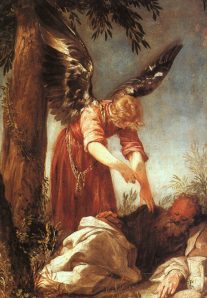 And he (Elijah) went forward, one day’s journey into the desert. And when he was there, and sat under a juniper tree, he requested for his soul that he might die, and said:
And he (Elijah) went forward, one day’s journey into the desert. And when he was there, and sat under a juniper tree, he requested for his soul that he might die, and said:
It is enough for me, Lord; take away my soul: for I am no better than my fathers.
And he cast himself down, and slept in the shadow of the juniper tree: and behold an angel of the Lord touched him, and said to him:
Arise and eat.
He looked, and behold there was at his head a hearth cake, and a vessel of water: and he ate and drank, and he fell asleep again. And the angel of the Lord came again the second time, and touched him, and said to him:
Arise, eat: for thou hast yet a great way to go.
And he arose, and ate and drank, and walked in the strength of that food forty days and forty nights, unto the mount of God, Horeb.
Responsorial Psalm 33:2-9 (Ps 34 NAB)
DR Challoner Text Only
I will bless the Lord at all times, his praise shall be always in my mouth.
In the Lord shall my soul be praised: let the meek hear and rejoice.
O magnify the Lord with me; and let us extol his name together.
I sought the Lord, and he heard me; and he delivered me from all my troubles.
Come ye to him and be enlightened: and your faces shall not be confounded.
This poor man cried, and the Lord heard him: and saved him out of all his troubles.
The angel of the Lord shall encamp round about them that fear him: and shall deliver them.
O taste, and see that the Lord is sweet: blessed is the man that hopeth in him.
Ephesians 4:30—5:2
Haydock New Testament
And grieve not the holy Spirit of God: whereby you are sealed unto the day of redemption. Let all bitterness, and anger, and indignation, and clamour, and blasphemy, be taken away from you, with all malice. And be ye kind one to another, merciful, forgiving one another, even as God hath forgiven you in Christ. BE ye, therefore, followers of God, as most dear children: And walk in love, as Christ also hath loved us, and hath delivered himself for us, an oblation and a sacrifice to God, for an odour of sweetness.
The Holy Gospel of Jesus Christ According to Saint John 6:41-51
Haydock New Testament
The Jews therefore murmured at him, because he had said: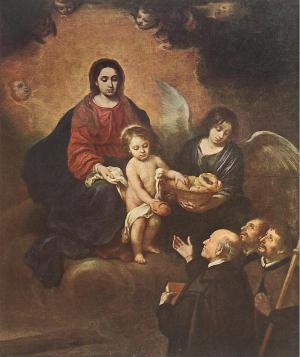
I am the living bread which came down from heaven.
And they said:
Is not this Jesus the son of Joseph, whose father and mother we know? How then saith he, I came down from heaven?
Jesus, therefore, answered, and said to them:
Murmur not among yourselves. No man can come to me, except the Father, who hath sent me, draw him: and I will raise him up at the last day. It is written in the prophets: And they shall all be taught of God. Every one that hath heard of the Father, and hath learned, cometh to me. Not that nay man hath seen the Father, but he, who is of God, he hath seen the Father.
Amen, amen, I say unto you: He that believeth in me, hath everlasting life. I am the bread of life. Your fathers did eat manna in the desert, and they died. This is the bread which cometh down from heaven: that if any one eat of it, he may not die. I am the living bread, which came down from heaven.
Haydock Commentary 3 Kings 19:4-8
Notes Copied From Haydock Commentary Site
- Ver. 4. Desert. It seems, towards Horeb. C. — Tree. Heb. Rothem, which term the Sept. retain, “Rathmen.” Sym. has, “a shade.” H. — Die. Elias requested to die, not out of impatience or pusillanimity, but out of zeal against sin; and that he might no longer be witness of the miseries of his people, and the war they were waging against God and his servants. See v. 10. Ch. — He does not wish to fall into the hands of Jezabel, lest the idolaters should triumph: but he is willing to die, if God so order it. C. — Mathathias entertained the like sentiments. 1 Mac. ii. 7. — Fathers: that I should live longer than they did. M. Eccli. xxx. 17. — If he had been weary of life, why did he flee? His answer to Achab shews that he was by no means timid. C.
- Ver. 6. Cake, baked in a hollow stone, covered with fire. The Arabs call such cakes, Ridpha. An angel brought this nourishment. C.
- Ver. 7. Go. Heb. “the journey is too great for thee,” without this support. H. — He spent forty days in this journey, as he did not follow the straitest road. Horeb is only about fifty leagues from Bersabee. C. — He might have travelled thither in four or five days. M.
- Ver. 8. In the strength of that food, &c. This bread with which Elias was fed in the wilderness, was a figure of the bread of life, which we receive in the blessed sacrament: by the strength of which we are to be supported in our journey through the wilderness of this world, till we come to the true mountain of God, and his vision in a happy eternity. Ch. — Horeb signifies “a rock, or dry wilderness.” C.
Haydock Commentary Ephesians 4:30—5:2
- Ver. 30. Grieve not the Holy Spirit: not that the Holy Ghost can be contristated. It is a metaphor; and the sense is, sin not against the Holy Ghost. Wi. — To contristate the Holy Spirit is a metaphorical expression, which signifies to offend God, or the Holy Ghost, who has sealed us by the sacraments of baptism and confirmation with particular marks, by which we shall be distinguished from others in the day of our retribution. SS. Chrysostom, Jerom, Ambrose, &c.
Haydock Commentary John 6:41-51
- Ver. 41. I am the living bread, which came down from heaven. These Jews did not believe that Christ was the true and eternal Son of God, who came down from heaven, and was made flesh, was made man. He speaks of this faith in him, when he calls himself the living bread, the mystical bread of life, that came to give life everlasting to all true and faithful believers. In this sense S. Augustine said, (trac. xxv. p. 489) why dost thou prepare thy teeth and belly? only believe, and thou hast eaten; but afterwards he passeth to his sacramental and real presence in the holy sacrament. Wi.
- Ver. 44. Draw him. Not by compulsion, nor by laying the free-will under any necessity, but by the strong and sweet motions of his heavenly grace. Ch. — We are drawn to the Father by some secret pleasure, delight, or love, which brings us to the Father. “Believe and you come to the Father,” says S. Austin, “Love, and you are drawn. The Jews could not believe, because they would not.” God, by his power, could have overcome their hardness of heart; but he was not bound to do it; neither had they any right to expect this favour, after the many miracles which they had seen. Calmet.
- Ver. 45. Every one, therefore, that hath heard of the Father, and hath learned of him who I am, cometh to me by faith and obedience. As to others, when the Scripture says they are taught by God, this is to be understood of an interior spiritual instruction, which takes place in the soul, and does not fall under the senses; but not less real on that account, because it is the heart, which hears the voice of this invisible teacher.
- Ver. 47. Thus Jesus Christ concludes the first part of his discourse: “Amen, amen, he that believeth in me, hath everlasting life;” which shews that faith is a necessary predisposition to the heavenly bread.
- Ver. 48. Because the multitude still insisted in begging for their corporal nourishment and remembering the food that was given to their fathers, Christ, to shew that all were figures of the present spiritual food, answered, that he was the bread of life. Theophylact. — Here Jesus Christ proceeds to the second part of his discourse, in which he fully explains what that bread of life is, which he is about to bestow upon mankind in the mystery of the holy Eucharist. He declares then, in the first place, that he is the bread of eternal life, and mentions its several properties; and secondly, he applies to his own person, and to his own flesh, the idea of this bread, such as he has defined it.
- Ver. 51. Christ now no longer calls the belief in him, or the preaching of the gospel, the bread that he will give them; but he declares that it is his own flesh, and that flesh which shall be given for the life of the world. Calmet. — This bread Christ then gave, when he gave the mystery of his body and blood to his disciples. Ven. Bede.
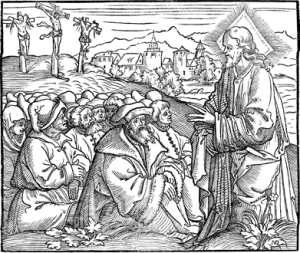 The Holy Gospel of Jesus Christ According to Saint John 12:24-26
The Holy Gospel of Jesus Christ According to Saint John 12:24-26

